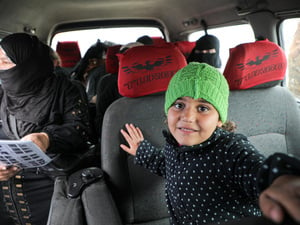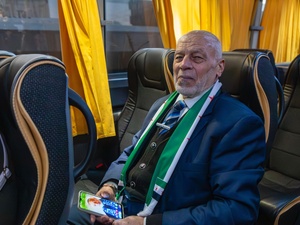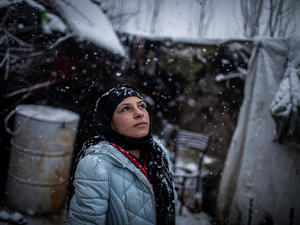UNHCR: Faster movement of people from Greek islands to mainland essential
UNHCR: Faster movement of people from Greek islands to mainland essential

Mohammed (15) helps his mother Nisrine Shiko (34) make a campfire to keep the family warm during the cold hours of the night. Back in 2013 as his father lay dying in his arms he told his son to take care of his mother.
UNHCR, the UN Refugee Agency, is today reiterating its call to accelerate the moving of asylum-seekers from the Aegean islands to the Greek mainland. Even with recent efforts to improve matters, conditions at many sites on the islands remain very poor. The need for better protection will become all the more acute this weekend when temperatures on the islands are expected to drop. We are worried.
Currently, the situation on Samos, Chios and Lesvos is of particular concern. On Samos, around 700 people including young children and other vulnerable individuals remain in unheated tents in the Reception and Identification Centre. While UNHCR and our partners have provided many hundreds of thermal blankets, sleeping bags and winter-protection kits, it’s clear that people would be better off on the mainland and should be moved there more quickly and in larger numbers. On Chios, at the Souda site, we have been working with our partners to install electric heaters in every accommodation unit and are sending more relief items to help people face the winter conditions. More fuel for heating is also being provided. On Lesvos, two heated Rubb halls have been set up at Moria to increase warm space, and another is on the north shoreline. Additional work is also under way in collaboration with Eurorelief to install insulation and wooden floors in more tents.
Transfers of asylum-seekers from the islands to the Greek mainland are allowed only after people have completed the registration process, or in cases of particular vulnerability. Slowness in registration or identifying vulnerable individuals and, previously, a shortage of suitable spaces on the mainland have been factors delaying moves. Among other things this has contributed to serious overcrowding of facilities built for far fewer people, and increased protection risks.
On the mainland, the challenges we faced just a few weeks ago are diminishing. Over the Christmas and New Year period UNHCR completed the winter preparation work for all the sites assigned to us by the Greek authorities and we are completing additional infrastructural upgrades elsewhere. At a number of sites where conditions were found to be sub-standard we have moved people in to better accommodation. In total UNHCR has created 21,000 accommodation places in apartments, with host families, or in other buildings. Some 700 places have been found for unaccompanied children in dedicated structures.
UNHCR reminds EU countries of the continued, urgent need to help resolve the situation in Greece through relocations of asylum-seekers to other Member States. As of two days ago (04 January), only 7,760 asylum seekers had left Greece or were scheduled to leave under the EU Relocation Mechanism agreed in late 2015 to relocate within 2 years. This represents around 12 per cent of the 66,400 agreed last year and is unacceptably low. UNHCR appeals to EU Member states to respect their previous commitments and offer additional spaces without further delay.
For further information on this topic, please contact:
- In Geneva, Cécile Pouilly, [email protected], +41 79 108 2625
- In Geneva, Vannina Maestracci, [email protected], +41 79 108 3532
- In Greece, Aikaterini Kitidi, [email protected], +30 69 51 85 46 61








